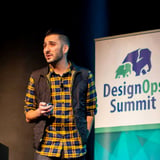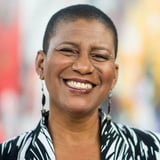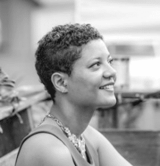Summary
As designers we want to reach people’s experiences, make their lives better, and ultimately contribute to a better condition of humanity and our planet. But something is getting in our way. Instead of delivering breakthrough experiences we are relegated to feeding bits into downstream implementation and operations. The enterprises we work for make us chase arbitrary, short sighted goals, and chase after the next release. Meanwhile, the key business decisions that determine the outcomes of our efforts have already been made. Enterprises are made of individuals forming great teams, applying a diverse set of skills, knowledge and experiences to ambitious projects. In order to bring this enormous potential to fruition, we need one thing: a shared understanding, appreciating each other’s viewpoints and backgrounds, tracing and translating decisions for greater impact on the whole. Milan will introduce you to EDGY – a language designed to achieve just that, relying on your core skills as experience designers and information architects: understanding enterprises as systems embedded in a wider ecosystem and navigating their multifaceted nature. You’ll take away an approach for co-creating their future working with elements, dynamics and dependencies, and radically increase your impact on the outcomes they produce for people.
Key Insights
-
•
Poor enterprise design often causes frustrating user experiences that UX design alone cannot fix, as operational and systemic issues lie outside the UX scope.
-
•
Stafford Beer's principle that the purpose of a system is what it actually does helps measure enterprises by their real outcomes, not just stated intentions.
-
•
Edgy provides a shared language across disciplines to align enterprise purpose (identity), operational architecture, and user experience as inseparable views.
-
•
Tasks reflect what users want accomplished and are central to connecting experience design with enterprise capabilities and products.
-
•
Enterprise awkwardness manifests in disengaged employees, operational failures, and negative customer experiences, largely due to poor systemic design.
-
•
Designing better enterprises requires creating conditions for collaboration and coherence across organizational silos rather than blaming individual roles or departments.
-
•
Using a Rosetta Stone approach, Edgy translates the same enterprise concept into languages used by designers, strategists, and architects to foster shared understanding.
-
•
The framework anchors complex enterprise elements into simple base types—people, outcomes, activities, and objects—to make modeling accessible.
-
•
Early adopters have adapted Edgy into innovative mixed models combining journeys, maps, and system views, confirming the power of a shared language for enterprise design.
-
•
UX designers can begin applying Edgy with familiar tools like journey mapping and service blueprints, then iteratively seek expert feedback to refine enterprise-wide models.
Notable Quotes
"The purpose of a system is what it does—so you can measure an enterprise by its outcomes, not just by its slogans or strategy documents."
"Blaming the system for failures is like blaming the garden for not growing—the system is made by the people within it."
"Whenever you make a process model or service blueprint, make a wrong model first, then let the experts correct it to build shared understanding."
"Edgy is like a Rosetta Stone for enterprises, expressing the same thing in languages designers, strategists, and architects use."
"Experience is one of three inseparable facets of an enterprise: identity (purpose), architecture (operations), and experience (value to people)."
"Enterprises are basically people pursuing outcomes, doing activities, and using objects—this simple theory underpins the language of Edgy."
"The problem with the bike rental app wasn’t UX design; it was the enterprise’s inability to distribute bikes to meet user demand."
"When enterprises are awkward, employees disengage, operations break down, and the customer experience suffers."
"Shared language lets different roles venture out of their comfort zones and collaborate on changing the enterprise system."
"Designing better enterprises means creating conditions for all parts to work together coherently, like gardening rather than blaming individual plants."
Or choose a question:
















More Videos

"UX research marketing is the strategy behind and implementation of intentional effective promotion and communication of who UX research is and what UX research does."
Molly FargotsteinMultipurpose Communication & UX Research Marketing
September 12, 2019

"Design operators must create scaffolding that shapes design practice, not just produce deliverables."
Dave MaloufClosing Keynote: Amplify. Not Optimize.
October 24, 2019

"The ultimate purpose with AI-augmented note-taking is to think more effectively, not to outsource thought."
Jorge ArangoAI as Thought Partner: How to Use LLMs to Transform Your Notes (3rd of 3 seminars)
May 3, 2024

"AI-generated UX is not about replacing designers, but removing grunt work to focus on higher-order design."
Daniel J. RosenbergDesigning with and for Artificial Intelligence
August 11, 2022

"If you’d rather exclude a group of people from using your product than do accessibility, then think about the impact you’re making."
Alexis LucioScaling Accessibility Through Design Systems
June 9, 2022

"I took roughly three months to get the first shareable version of the roadmap, including onboarding and interviews."
Peter BoersmaHow to Define and Maintain a DesignOps Roadmap
October 3, 2023

"Making the invisible visible makes things move forward and create alignments."
Ben Reason Aline Horta Majid Iqbal Fabiano LeoniMaking the system visible: The fastest path to better decisions
November 20, 2025

"Sometimes you have to build stuff and learn from it rather than wait for the perfect moment or tools."
Peter Van Dijck Louis RosenfeldCoffee with Lou #4: Taking a Peek Under the Rosenbot's Hood
June 14, 2024

"AI-driven results are often 30 to 50 percent hallucinogenic—meaning not real—so we need to be cautious about overreliance."
Taylor KlassmanShaping the Next Era of UX Research: Collaborative Forum
March 11, 2025
















